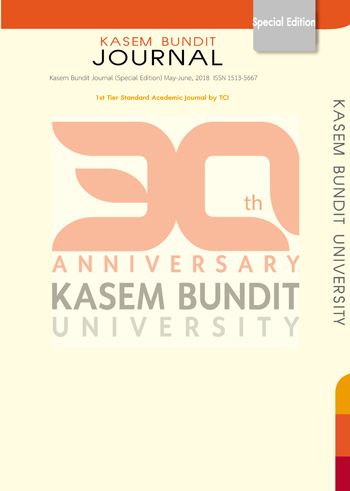The role of transformational leadership in the classroom and students’ outcomes: A case study of the aviation institute
Keywords:
transformational leadership, student outcomes, aviation instituteAbstract
Transformational leadership is an effective leadership style that influences followers outcomes in different contexts e.g., business, non-profit organizations, and educational setting. The role of instructors as transformational leaders in the classroom can influence students’ outcomes, both objective and subjective. This study aims to investigate the relationship between the role of instructors as transformational leaders and student outcomes. The research method consists of (a) data collection via questionnaire, and (b) data analysis through structural equation modelling (SEM). The results contribute to the aviation institute by emphasising the role of instructors in enhancing students’ outcomes.
References
[1] ONEC. (2008). “Eight basic virtue reports” [in Thai]. Retrieved on 07 March 2018 on www.onec.co.th
[2] Bass, B. M. (1985). Leadership and Performance Beyond Expectations. New York, NY: Free Press.
[3] Berry, G. R. and Workman. L. (2007). “Broadening student societal awareness through service learning and civic engagement” Marketing Educational Review. Vol.17 (Issue 3): 21-32.
[4] Bolkan, S. and Goodboy, A. K. (2010). “Transformational leadership in the classroom: The development and validation of the student intellectual stimulation scale” Communication Report. Vol.23. (Issue 2): 91-105.
[5] Bolkan, S., and Goodboy, A. K. (2009). “Transformational leadership in the classroom: Fostering student learning, student participating, and teacher credibility” Journal of Instructional Psychology. Vol.36 (Issue 4): 296-306.
[6] Cranwell, P. B., Davis, F. J., Elliot, J. M., McKendrick, J. E., Page, E. M. and Spillman, M. J. (2017) “Encouraging independent thought and learning in first year practical class” New Direction in Teaching of Physical Science. Vol.12 (Issue 1): 1-6.
[7] DeVellis, R. F. (2017). Scale Development: Theory and Applications 4th Edition. Thousand Oaks, CA: Sage.
[8] Harkness, J. A., and Schoua-Glusberg, A. (1998). “Questionnaires in translation” Retrieved on 4 September 2017 from www.semanticscholar.org/631f/1202fd333f5939a42764c72c525187905568
[9] Harrison, C. and Killion, J. (2007). “Teachers as leader” Educational leadership. Vol.15. (Issue 1): 74-77.
[10] Harvey, S., Royal, M. and Stout, D. (2003). “Instructor’s transformational leadership: University student attitudes and ratings” Psychological Reports. Vol.92. (Issue 2): 395–402.
[11] Houchens, G. W., Zhang, J. and David, K. (2017). “The impact of positive behaviors interventions and supports on teachers’ perceptions of teaching conditions and student achievement”. Journal of Positive Behaviors Interventions. Vol.19 (Issue 3): 168-179.
[12] Krieger, L. S. (2005). “The inseparability of professionalism and personal satisfaction: Perspective on values, integrity and happiness” Clinical Law Review. 11: 425-445
[13] Kyriakides, L., Creemers, B. P. M. and Antioniou, P. (2009). “Teachers behavior and student outcomes: Suggestions for research on teacher training and development” Teacher and Teaching Education. Vol.25 (Issue 1): 12-23.
[14] Northouse, P. G. (2016). Leadership: Theory and practice. Edition no. 7. Thousand Oaks, CA: Sage.
[15] OECD. (2011). “What are the social outcomes of education?” Education at a Glance 2011: OECD Indicators. OECD Publishing.
[16] Oqvist, A. and Malmstrom, M. (2017). “What motivates stud
Downloads
Published
How to Cite
Issue
Section
License
ทัศนคติ ความคิดเห็นใด ๆ ที่ปรากฏในวารสารเกษมบัณฑิตฉบับนี้เป็นของผู้เขียน โดยเฉพาะ มหาวิทยาลัยเกษมบัณฑิตและบรรณาธิการ ไม่จำเป็นต้องมีความเห็นพ้องด้วย







